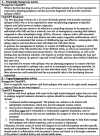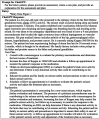Improving Neurology Clinical Care With Natural Language Processing Tools
- PMID: 37816638
- PMCID: PMC10727205
- DOI: 10.1212/WNL.0000000000207853
Improving Neurology Clinical Care With Natural Language Processing Tools
Erratum in
-
Correction to Author Disclosures.Neurology. 2024 Dec 24;103(12):e210123. doi: 10.1212/WNL.0000000000210123. Epub 2024 Nov 21. Neurology. 2024. PMID: 39571126 Free PMC article. No abstract available.
Abstract
The integration of natural language processing (NLP) tools into neurology workflows has the potential to significantly enhance clinical care. However, it is important to address the limitations and risks associated with integrating this new technology. Recent advances in transformer-based NLP algorithms (e.g., GPT, BERT) could augment neurology clinical care by summarizing patient health information, suggesting care options, and assisting research involving large datasets. However, these NLP platforms have potential risks including fabricated facts and data security and substantial barriers for implementation. Although these risks and barriers need to be considered, the benefits for providers, patients, and communities are substantial. With these systems achieving greater functionality and the pace of medical need increasing, integrating these tools into clinical care may prove not only beneficial but necessary. Further investigation is needed to design implementation strategies, mitigate risks, and overcome barriers.
© 2023 American Academy of Neurology.
Conflict of interest statement
W. Ge, H.J. Rice, and I.S. Sheikh report no conflicts of interest. M.B. Westover is a co-founder and holds equity in Beacon Biosignals, and receives royalties for authoring Pocket Neurology from Wolters Kluwer and Atlas of Intensive Care Quantitative EEG by Demos Medical. M.B. Westover was supported by grants from the NIH (R01NS102190, R01NS102574, R01NS107291, RF1AG064312, RF1NS120947, R01AG073410, R01HL161253, R01NS126282, R01AG073598), and NSF (2014431). A.L. Weathers has a noncompensated relationship as the chair of the Epic Neurology Specialty Steering Board (Epic Systems) and has received personal compensation in the range of $5000 to $9000 for serving as a CME question writer and interviewer for the American Academy of Neurology. She reports no conflicts of interest. L.K. Jones has received publishing royalties from a publication relating to health care, has noncompensated relationships as a member of the board of directors of the Mayo Clinic Accountable Care Organization and the American Academy of Neurology Institute, and has received personal compensation in the range of $10,000 to $49,999 for serving as an editor, associate editor, or editorial advisory board member for the American Academy of Neurology. L. Moura receives research support from the CDC (U48DP006377) and the NIH (NIA 1 R01 AG073410-01, NIA 1 R01 AG062282, NIA 2 P01 AG032952-11). She also serves as consultant to the Epilepsy Foundation. She reports no conflicts of interest. Go to
Figures



References
-
- Villasenor J. How ChatGPT Can Improve Education, Not Threaten It. Scientific American; 2023.
-
- OpenAI. GPT-4 Technical Report. 2023.
Publication types
MeSH terms
Grants and funding
LinkOut - more resources
Full Text Sources
